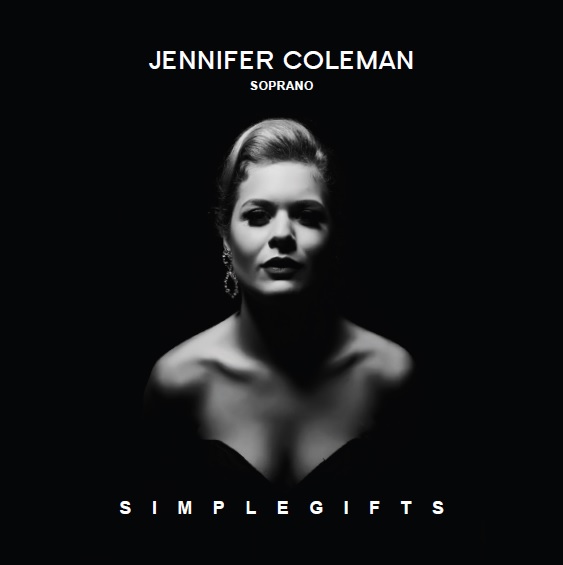|
‘Simple Gifts’ is the 6 track debut E.P. self-released by Jennifer Coleman in 2014.
All of the profits will go towards her tuition fees for studying at The Royal College of Music, London. The classical singer specialises in performing with string quartet. She is best known for singing opera arias, classical crossover songs, ballads, musical theatre numbers and hymns. The beauty of her voice has made her a popular choice for events, parties and as a wedding singer across the UK and internationally. Jennifer has won numerous awards including the Mavis Bennett Award for Grand Opera and the John Lightfoot Award for Musical Theatre at Maidenhead Music Festival. Throughout her career she has performed at the UK’s leading venues; cementing her status as a rising star of the future. She has also been praised for her efforts for charities and good causes. The Berkshire born soprano believes that classical music should be accessible to everyone. It has become her mission; “to share a piece of my heart with as many people as possible through the medium of song.” She hopes that her first E.P. ‘Simple Gifts’ will be the first of many steps towards achieving this goal. 1. Mozart: Laudate Dominum – 3:50 Laudate Dominum is a sacred work written in 1779 by Wolfgang Amadeus Mozart as part of his Vesperae solennes de Dominica, K. 321. The work was composed for use on Sunday services “de Dominica” at the Salzburg Cathedral. This extended aria was set originally for soprano soloist and SATB choir. The first part of the text is the entire Psalm 117 and the second is the standard Catholic Doxology that follows many texts and all the Psalms. Jennifer says: “I chose Laudate Dominum because I like it, I think it is a great piece for introducing new listeners to classical music. The long melodic phrases attract the attention of the listener’s intrigue as it builds tension towards the climax. I also think that the meaning of this prayer is simply beautiful; a message of giving thanks.” LATIN Laudate Dominum omnes gentes / Praise the Lord, all ye nations Laudate eum omnes populi / Praise him, all ye peoples. Quoniam confirmata est / For his loving kindness mercy super nos misericordia ejus / has been bestowed upon us, et veritas Domini manet / and the truth of the Lord endures in aeternum / for eternity. Gloria patri et filio / Glory to the Father, Son, et spiritui sancto / and to the Holy Spirit; sicut erat in principio / as it was in the beginning, et nunc et semper is now /and ever shall be, et in saecula saeculorum / world without end. Amen / Amen. 2. Traditional: Simple Gifts – 2:11 This traditional Shaker melody was written and composed in 1848 by Elder Joseph Brackett. “Turning” is a common theme in Christian theology, but in the context of this song, it could also be considered dance instructions along with “to bow and to bend”. For this reason it is best to classify this as a Dance song rather than a hymn. Jennifer says: “The title song of this EP, I thought the name rang true with the message that I want to share with people; message of giving through music. I first knew this melody from singing the hymn “Lord of the Dance” at church growing up. It is timeless and the lyrics are wholesome with their message of simplicity, freedom and love.” ENGLISH 'Tis the gift to be simple, 'tis the gift to be free 'Tis the gift to come down where we ought to be, And when we find ourselves in the place just right, 'Twill be in the valley of love and delight. When true simplicity is gained, To bow and to bend we shan't be ashamed, To turn, turn will be our delight, Till by turning, turning we come 'round right. 3. Schubert: Ave Maria – 5:12 In 1825 Franz Schubert composed one of the most famous classical songs in German as part of his settings of seven songs from Walter Scott's poem The Lady of the Lake. Originally in German and called "Ellens dritter Gesang" / “Ellen’s third song”, it became popular when the context was changed into a prayer under the title Ave Maria using traditional latin text. Jennifer says: “This is my most requested song to perform at weddings and funerals. It was the first song that I definitely knew I wanted to include on my EP. It is such a beautiful melody and instantly recognisable. It is also a very personal song for many people as it holds sentimental value from special occasions when it is often performed.” LATIN Ave Maria, gratia plena, / Hail Mary, full of grace, Maria, gratia plena / Mary, full of grace, Ave, Ave, Dominus / Hail, Hail, the Lord Dominus tecum / The Lord is with thee. Benedicta tu in mulieribus, et benedictus, / Blessed art thou among women, and blessed Et benedictus fructus ventris (tui), / Blessed is the fruit of thy womb, Ventris tui, Jesus. / Thy womb, Jesus Ave Maria! Ave Maria! Sancta Maria, Mater Dei, / Holy Mary, Mother of God, Ora pro nobis peccatoribus, / Pray for us sinners, Ora, ora pro nobis; / Pray, pray for us; Ora, ora pro nobis peccatoribus, / Pray for us sinners, Nunc et in hora mortis, / Now, and at the hour of our death In hora mortis nostrae. / The hour of our death. Ave Maria! / Ave Maria! 4. Bizet: Habanera – 4:19 From the opera Carmen by George Bizet in 1875, Habanera is the popular name for the aria “L'amour est un oiseau rebelle" / “Love is a rebellious bird”. The name habanera comes from a dance rhythm used throughout the aria that came over from Cuba; the “habanera rhythm”. Melodically the aria is based on a descending chromatic scale and variations of this in both major and minor depending on the mood of the lyrics. Jennifer says: “In the opera Carmen, this is the first time we meet the title character; she is dark, fierce, beautiful, a seductress and not your usual heroine. Carmen was one of the first operas that I performed in as part of the chorus during my undergraduate studies at The Royal Northern College of Music in Manchester. This was always my favourite scene.” FRENCH L'amour est un oiseau rebelle / Love is a rebellious bird Que nul ne peut apprivoiser, / That none can tame, Et c'est bien en vain qu'on l'appelle, / And it is well in vain that one calls it S'il lui convient de refuser. / If it suits him to refuse Rien n'y fait, menace ou prière; / Nothing to be done, threat or prayer. L'un parle bien, l'autre se tait, / The one talks well, the other is silent; Et c'est l'autre que je préfère; / And it's the other that I prefer Il n'a rien dit mais il me plaît. / He says nothing but he pleases me. L’amour… / Love… L'amour est l'enfant de Bohême, / Love is a gypsy's child, Il n'a jamais, jamais connu de loi; / It has never, never known the law; Si tu ne m'aimes pas, je t'aime; / If you do not love me, I love you; Si je t'aime, prends garde à toi! / If I love you, take guard yourself Si tu ne m'aimes pas, / If you do not love me, Si tu ne m'aimes pas, je t'aime; / If you do not love me, I love you Mais si je t'aime, si je t'aime; / But if I love you, if I love you Prends garde à toi! / Take guard yourself! L'oiseau que tu croyais surprendre / The bird you hoped to catch Battit de l'aile et s'envola. / Beat its wings and flew away L'amour est loin, tu peux l'attendre; / Love is far, you can wait for it Tu ne l'attends plus, il est là. / You no longer await it, there it is Tout autour de toi, vite, vite, / All around you, swift, swift, Il vient, s'en va, puis il revient. / It comes, goes, then it returns. Tu crois le tenir, il t'évite, / You think to hold it fast, it flees you Tu crois l'éviter, il te tient! / You think to flee it, it holds you 5. Puccini: O mio babbino caro – 3:25 From Puccini’s 1918 opera Gianni Schicchi, “O mio babbino caro” is probably one of the most popular lyrical arias in a soprano’s standard repertoire; often performed as an encore after recitals. In the aria Lauretta is pleading with her father to let her marry the man that she loves; or else she will throw herself into a River. Jennifer says: “Lauretta is a classic diva – she knows exactly what she wants, and she tries to manipulate her father in how to get it. The melodic line (as with many of Puccini’s melodies) is simply divine and really fits the soprano voice like a glove. I love singing this, and when I do, I feel such a connection with it. I can easily get lost in the moment performing this aria.” ITALIAN O mio babbino caro, / Oh my dear papa, mi piace, è bello, bello. / I love him, he is handsome, handsome. Vo'andare in Porta Rossa / I want to go to Porta Rossa a comperar l'anello! / To buy the ring! Sì, sì, ci voglio andare! / Yes, yes, I want to go there! e se l'amassi indarno, / And if my love were in vain, andrei sul Ponte Vecchio, / I would go to the Ponte Vecchio ma per buttarmi in Arno! / And throw myself in the Arno! Mi struggo e mi tormento! / I am anguished and tormented! O Dio, vorrei morir! / Oh God, I'd like to die! Babbo, pietà, pietà! / Papa, have pity, have pity! 6. Mozart: Alleluia – 2:47 Mozart wrote “Alleluia” in 1773 as part of his motet “Exsultate, Jubilate” K. 165. Originally written for castrato, since the extinction of this type of singer (a male who has been castrated so his voice did not change at puberty), in modern times it is performed by Soprano. Alleluia is the Allegro movement. Jennifer says: “I thought that beginning and ending with Mozart was a nice way to unify my EP. “Alleluia” (although still a religious work) is drastically different from “Laudate Dominum” by the same composer. The coloratura (fast notes) in this piece are technically challenging and the atmosphere of both songs are quite contrasting. Credits Soprano – Jennifer Coleman, Quartet – Leos Strings: Caroline Pether & Simran Singh (violins), Rhiannon James (viola), Rachel Shakespeare (cello), Arrangements – Prof. Joel Jacklich, Sound Recording – Lethal Music: Tim Duncan, Photography – Alt Studios: Simon Hunt, Graphic Designer – DMS Ltd: Darren Rowe With Special Thanks to – My family for all of their love and support, The Royal Northern College of Music for rehearsal rooms, Cafe Istanbul, Manchester for Recording Space tweet: @Jenny_Coleman This recording is licensed under a Creative Commons Attribution-NonCommercial-ShareAlike 3.0 Unported License. (CC BY-NC-SA 3.0) Copyright © 2014 Jennifer Coleman | All Rights Reserved
1 Comment
Dear Friends,
I am thrilled to announce my fantastic news! …But I need your help. I have recorded my debut E.P. Simple Gifts with String Quartet and it will be available to download on Friday 14th February 2014! YAY! All of the profits will go towards my £10,017 tuition fees for studying at The Royal College of Music in London. I have decided to sell my music on a “pay what you want” philosophy. If you aren’t too sure about classical music this gives you the option to “try before you buy.” If you don’t have money you can download it for free, but I ask that you share my music with your friends in return. If you like it you can always come back at another time when you are able to. And if you are more financially free, you can use this as an opportunity to support my art, and allow access to other listeners through your generosity. Here is where I need your help: I need your support in sharing my music with your friends. I believe that classical music should be accessible to everyone. My mission is to “to share a piece of my heart with as many people as possible through the medium of song”. I encourage audiences to share my songs; introducing new listeners to classical music. I hope that you will support my art and help me on my musical journey on Friday 14th February when my debut E.P. Simple Gifts will become available to download. Thank you. JC www.jennifer-coleman.co.uk Yes you read that correctly. I have created my own shop where you can buy gifts designed by me for the diva in your life... Here are some of my favourites:JC SOPRANO kiss Designed using vintage 80s pink lipstick from my Mum's makeup box. The perfect gift for the soprano diva in your life. Go on, spoil the diva in your life.
JC |
AuthorJennifer Coleman - is a classical / opera singer, and vocal coach, performing across the UK and internationally. Archives
January 2024
|
|
Opera and classical singer available now for performances in London, Manchester, Birmingham, Oxford, Berkshire, Buckinghamshire, South Bucks, Berks, Liverpool, Kent and internationally.
|
|
Copyright © 2010-2016 Jennifer Coleman | All Rights Reserved












 RSS Feed
RSS Feed
